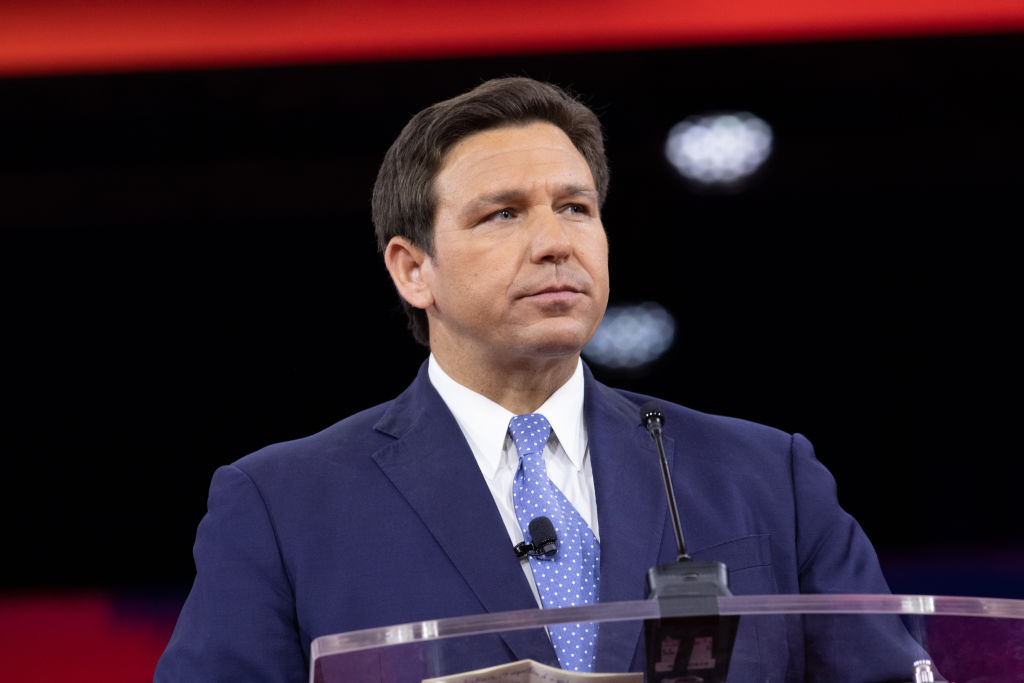
After passing a flurry of restrictive voting laws over the last year, Republican state lawmakers have a new item on their agenda: election police forces.
On March 9, Florida’s legislature approved the creation of such a unit, which would include an office of 25 staffers and cost about $2.5 million. Just a week later, on March 15, Georgia’s Republican-dominated House approved a similar but more vague measure that would allow the Georgia Bureau of Investigations (GBI), which has no expertise in voting or elections, to prosecute election crimes; that measure now heads to the state Senate. Such units would be among the first of their kind in the country.
Republicans, citing false claims of widespread voter fraud, say the proposals are necessary to secure elections by preventing voter fraud. But voting rights advocates say that’s disingenuous. Numerous studies, including one commissioned by the Trump Administration, have revealed infinitesimally few instances of real voter fraud nationwide; an AP investigation found fewer than 475 potential cases of fraud out of 25.5 million ballots cast in six states where Trump and his allies disputed results.
Instead, voting rights advocates say these laws are designed to reduce voter turnout, especially among racial and ethnic minorities, who tend to vote Democratic.
When Georgia voters hear that police will be investigating election issues, that will have a chilling effect, says Aklima Khondoker, chief legal officer at the New Georgia Project, which opposes the Georgia measure. “If you think you made a mistake, and now you’re going to be investigated by the GBI, that’s big and scary,” Khondoker says, adding that the GBI does not generally investigate election law. “They consider criminal matters almost exclusively,” she says.
Read More: Poll Watchers Flood Virginia as GOP Raises Doubts About ‘Election Integrity’
In Florida, Brad Ashwell, state director for All Voting is Local in Florida, says the laws will likely disproportionately deter minority voters. “It creates a climate of fear that if they misstep they’re going to have election police coming after them,” he says. “And it feeds into nearly a century of history of law enforcement being used for voter intimidation purposes, which has historically mostly impacted Black and Hispanic and other marginalized voters.”
Florida’s measure appears likely to become law. Republican Governor Ron DeSantis originally called for a far more ambitious election police force that would have included more than 50 full-time staff and cost almost $6 million; the current proposal, while weaker, is in line with his broader goal. Mark Early, supervisor of elections for Leon County, which includes Tallahassee, says the original proposal was “much, much worse” because it was more expensive and demanded the devoting of more resources to prosecuting election crimes. The current measure, he says, is “primarily unnecessary.”
“Are the miniscule numbers of legitimate complaints that are going to be investigated really going to justify this?” says Abdelilah Skhir, voting rights policy strategist for the ACLU of Florida. “ It’s a solution looking for a problem.”
Georgia’s measure faces more headwinds. While Georgia Governor Brian Kemp has supported the Republican “election integrity” platform, he said in January that he would not sign any more changes to the state’s election law. But political pressures loom. Kemp faces Trump-backed David Perdue in the Republican primary on May 24. Perdue has embraced the measure explicitly, calling for an “Election Law Enforcement Division” in the state.
Republican Secretary of State Brad Raffensperger, who rose to national fame in the months following the 2020 presidential elections after President Trump asked him, in a recorded phone call in January 2021, to “find” 11,780 more Republican votes, has also called for increased security at polling places. “This year, we’re going to have hard-fought campaigns that are going to be watched all across the country, and every indication is that we’re going to have close races,” Raffensperger said at a February press conference. “With that environment, it only makes sense to provide additional resources for election security, so that everyone can have confidence in the results.”
Read More: Abolishing the Filibuster Is Not the Only Way to Pass Voting Rights Legislation
Georgia’s proposal takes away power from the state election board and Secretary of State’s office, which are currently the main entities charged with investigating claims of election crimes, and gives it to the GBI. . Voting rights advocates say the current system allows for more discretion and offers people an opportunity to account for the problem. The GBI, they say, may be more likely to rush to prosecution because it specializes in criminal investigations.
“Our fear now is, if you pass this along to the GBI, they’re going to start issuing subpoenas to people. They’re going to make these big requests of folks who don’t understand the election infrastructure that Georgia currently has,” Khondoker says. She adds that the proposal lacks clarity in what role the state election board or Secretary of State’s Office would play, in addition to having no cost estimate or proposed analysis on the possible racial impact of the measure.
Florida’s proposal does not define which “election irregularities” might trigger an investigation. Ashwell suggests Republican lawmakers left the language “purposely” vague, so investigators can go after anything they perceive as being a problem.”
“It lacks guardrails,” Ashwell warns, “that could prevent it from being politically weaponized.”
More Must-Reads from TIME
- Inside Elon Musk’s War on Washington
- Meet the 2025 Women of the Year
- The Harsh Truth About Disability Inclusion
- Why Do More Young Adults Have Cancer?
- Colman Domingo Leads With Radical Love
- How to Get Better at Doing Things Alone
- Cecily Strong on Goober the Clown
- Column: The Rise of America’s Broligarchy
Write to Sanya Mansoor at sanya.mansoor@time.com